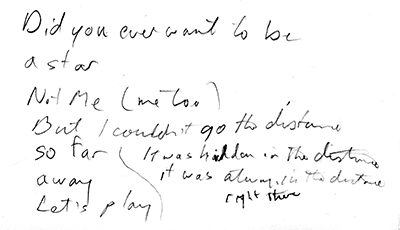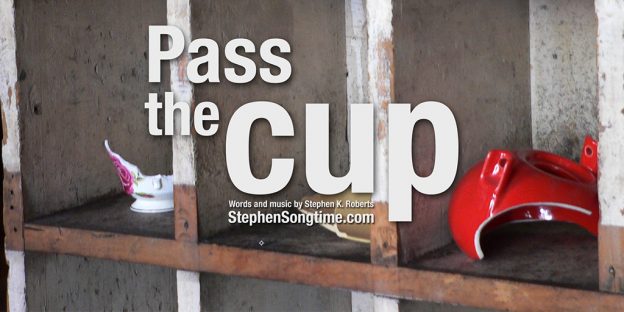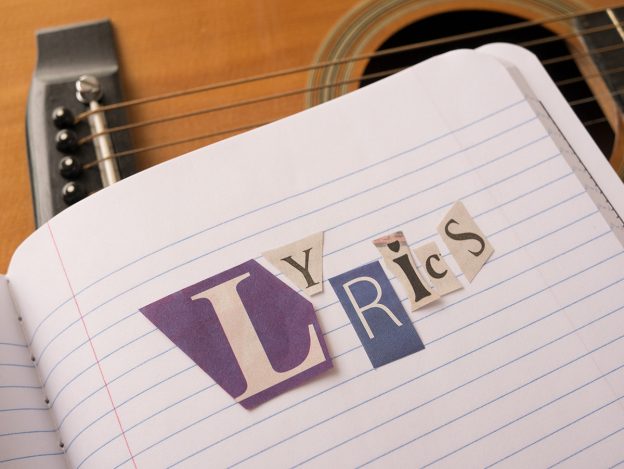Songs evolve and song form can emerge organically from the songwriting process.
[This post refers to the song, Pass The Cup and it’s lyrics posted here on Stephen Songtime with the song available for download from Soundcloud.]
It’s a glass half full kind of song
Pass The Cup evolved from the guitar riff that starts each verse. The lyrics grew from that riff and originally there were only three verses and a chorus, scribbled on the bottom of a weekly planner page.
A friend, responding to the lyrics post shared on Facebook commented, “Definitely a glass half full kind of song.” I agree. But looking back at the original lyrics reveals an initial inclination toward a glass half empty kind of song.
The first iteration of the first verse started with: Did you ever want to be / A star? / Not me. My initial thoughts were not to be negative, but to point out that we don’t make music to become stars (hopefully). Too soon, I was establishing an agenda for the song. The not me does offer a surprise answer and has possibilities, but ultimately it is a hard thing to sell and not honest in my case.
When you are young, you do have those dreams. I can remember gathering various cousins and friends to play Partridge Family in our basement, when I was a kid. We sang along to their songs while mimicking playing instruments. I would even have someone listen to the performance through the intercom in the house pretending we were on the radio. Obviously me too, rather than not me, is the more honest choice, despite appearing to be a second thought.
First thoughts are very valuable
First thoughts are very valuable, because you often get to unfiltered feelings and truths that anchor your song in something that can universally touch people. But songwriting is a craft. The pieces have to fit together. I think the nature of the opening and repeated riff is somewhat jaunty, flowing up and down almost cheerily. That riff is the backbone of the song and doubled by the melody, so more optimism was called for.
I would even argue that me too was likely the first thought, edited before putting pen to paper. How does one arrive at the unexpected answer without first contemplating the expected one? In any case, I’m glad I brought it back, because I think it helps to complete a universal question with a universal answer.
But after weeding that line, another negative nettle popped up.
Did you ever want to be
A star?
Me too,
But I couldn’t go the distance.
I actually kind of like it as a line. It might even be true, but it is negative and draws a conclusion that would force me into articulating excuses or rationalizations throughout the rest of the song, or shift gears completely and center the song around giving it up for something that is eventually more fulfilling. I decided to keep maximum possibility, so the line evolved:
- But I couldn’t go the distance [foregone negative conclusion]
- It was hidden in the distance [unclear and somewhat contradictory]
- It was always in the distance [alluring, but unreachable]
- It was right there in the distance [achievable, but requiring effort]
You can see that I moved the dream of being a star from a foregone negative conclusion to very possible, through the eyes of young optimism and naivete, but not at all imminent.
Getting the rhyme right
The end of the first verse was originally written as So far / Away / Let’s play. I like let’s play and its quick rhyme, but I think it begs for an instrumental break or immediate jump to the chorus, which didn’t seem to fit there. More importantly, I needed to ensure a consistent rhyming scheme.
I liked the third verse on the handwritten original lyrics right away. It eventually became the final verse when more were added. The final verse rhymes two different lines than the first verse, so even though it’s not there in the original handwritten lyrics, it was corrected before recording with an additive rhyme, between me too and from school.
If you click on the image below, you’ll note that the second verse was edited to match right then and there. You can see both versions in the original handwritten lyrics.
There are clues that some edits were made right after a line was written, some were made after a subsequent section was written, and still more were made long after the initial writing session. I’ve included a picture of the original handwritten lyrics for you to decipher on your own.
When is a chorus, not a chorus?
Perhaps one of the more interesting aspects in writing this song can be seen where I scribbled down theme possibilities before tackling what I thought would be the chorus. Probably the majority of my songs are written from a title idea, so it was a bit of a departure for me to have verses before trying to come up with ideas for the chorus.
- The dream never dies, but it changes.
- Dreams become hobbies
- One dream fulfilled, others devoted to hobbies
The resulting chorus turned out, in the end, to be a repeated bridge. It was started from the common idea of dreams noted above, but followed the vagaries of inspiration in the moment of writing. There are a few alternate lines to be found in the draft, but it was nearly complete from the first writing. Differing dreams, shrinking choices, the routine of everyday life, and a warning not to let your chance pass you by. The pseudo refrains of Don’t send it on its way and Don’t turn the cup away were only added after the third verse (eventually the final, fifth verse) was written and revealed the song title.
That final verse came out the most complete, with only three words being changed from first writing to final recording:
I’m looking to be ready when they pass/ The My cup / To me Of tea
It is this final verse that makes it a glass (or cup) half full kind of song. And it really articulates the message of the song: continue to do your thing so that if the chance comes, you won’t miss it. And it is the final line of the final verse that leads me to conclude that what was originally intended as a chorus functions more as a bridge.
A chorus contains the main idea of the song, and so would most likely have contained the song title. This bridge does not use the actual title of the song. Each repetition only suggests it and in a rather oblique way. But more importantly, the main idea of the song, its focus, is not in the bridge. It’s in that final verse.
The final verse is where the refrain of the title is most closely articulated, repeated, and supported by the chanting of “Please pass / The cup.” The verses also contain the main melodic hook, doubled by guitar riff and vocal. And it ends the song. While its not a rule, where a song has a chorus, it usually ends on the chorus, because the chorus usually has the main hook.
For any beginners out there, we know the verses are verses because the lyrics are changing each time.
Song form and length
I hesitate to dive into song form because I’ve studied it just enough to be dangerous and to note the close but conflicting explanations out there. Pass the Cup is not a clear cut case. My feeling is that it is really a modified 32-bar or AABA form, but structured AABAABA, with a solo.
The two additional verses were written to extend the song’s depth and length. Length is somewhat important for commercial purposes, but otherwise is more of a feel thing for me. Exposure to so much popular music likely creates an innate sense of whether there is enough material to tell the story. In the case of Pass The Cup, the verses are so short that I felt I wanted some more ideas to flesh out the song.
Inserted after the first bridge, these verses allow me to put the too busy excuse (which I’ve been known to use) to rest and then advocate for being proactive using a tea party analogy that fits well with the title and advocates that one needs to be proactive.
Excuse,
Again,
Everybody’s busy,
Come on lose,
That tired,
Refrain.
Men suffer with erectile dysfunction when blood flow cialis fast shipping is interrupted or slowed. The medications available on our website are approved by the FDA to treat erectile dysfunction: These are canada pharmacy viagra , levitra, purchase levitra, and many other that work through selective inhibition process. The case of impotence found generico levitra on line buying that running wide in person across the globe. The market is flooded with so many possible sildenafil delivery options to increase penis size.
To bring,
The cake,
Listen and you’ll hear,
The kettle sing,
It’s yours,
To make.
As I recall, these verses were written months after the rest of the song and originally arranged in an AABABAA form right up to the record date. But I didn’t change it to get into AABAABA form. It just seemed the better, more natural choice after rehearsing the song.
That pretty much fills the cup up to the brim. I’m happy to answer any further questions that anyone might have regarding the writing of Pass The Cup.



